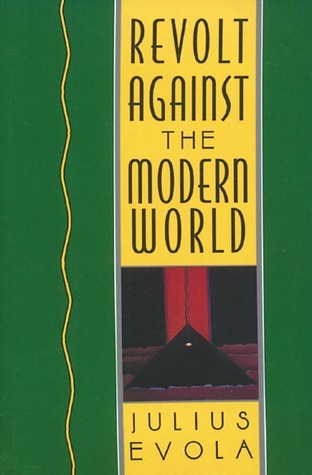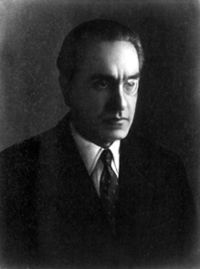
In what many consider to be his masterwork, Evola contrasts the characteristics of the modern world with those of traditional societies, from politics and institutions to views on life and death. "No idea is as absurd as the idea of progress, which together with its corollary notion of the superiority of modern civilization, has created its own 'positive' alibis by falsifying history, by insinuating harmful myths in people's minds, and by proclaiming itself sovereign at the crossroads of the plebeian ideology from which it originated. In order to understand both the spirit of Tradition and its antithesis, modern civilization, it is necessary to begin with the fundamental doctrine of the two natures. According to this doctrine there is a physical order of things and a metaphysical one; there is a mortal nature and an immortal one; there is the superior realm of 'being' and the inferior realm of 'becoming.' Generally speaking, there is a visible and tangible dimension and, prior to and beyond it, an invisible and intangible dimension that is the support, the source, and the true life of the former." —From Chapter One. With unflinching gaze and uncompromising intensity Julius Evola analyzes the spiritual and cultural malaise at the heart of Western civilization and all that passes for progress in the modern world. As a gadfly, Evola spares no one and nothing in his survey of what we have lost and where we are headed. At turns prophetic and provocative, Revolt against the Modern World outlines a profound metaphysics of history and demonstrates how and why we have lost contact with the transcendent dimension of being. The revolt advocated by Evola does not resemble the familiar protests of either liberals or conservatives. His criticisms are not limited to exposing the mindless nature of consumerism, the march of progress, the rise of technocracy, or the dominance of unalloyed individualism, although these and other subjects come under his scrutiny. Rather, he attempts to trace in space and time the remote causes and processes that have exercised corrosive influence on what he considers to be the higher values, ideals, beliefs, and codes of conduct—the world of Tradition—that are at the foundation of Western civilization and described in the myths and sacred literature of the Indo-Europeans. Agreeing with the Hindu philosophers that history is the movement of huge cycles and that we are now in the Kali Yuga, the age of dissolution and decadence, Evola finds revolt to be the only logical response for those who oppose the materialism and ritualized meaninglessness of life in the twentieth century. Through a sweeping study of the structures, myths, beliefs, and spiritual traditions of the major Western civilizations, the author compares the characteristics of the modern world with those of traditional societies. The domains explored include politics, law, the rise and fall of empires, the history of the Church, the doctrine of the two natures, life and death, social institutions and the caste system, the limits of racial theories, capitalism and communism, relations between the sexes, and the meaning of warriorhood. At every turn Evola challenges the reader's most cherished assumptions about fundamental aspects of modern life.
Author

Julius Evola (19 May 1898 – 11 June 1974), born Giulio Cesare Andrea Evola, was an Italian philosopher and esoteric scholar. Born in Rome to a family of the Sicilian landed gentry, Evola was raised a strict Catholic. Despite this, his life was characterised by 'an anti-bourgeois approach' hostile to both 'the dominant tradition of the West—Christianity and Catholicism—and to contemporary civilization—the 'modern world' of democracy and materialism'. By turns 'engineering student, artillery officer, Dadaist poet and painter, journalist, alpinist, scholar, linguist, Orientalist, and political commentator', he has been described as a 'rare example of universality in an age of specialization'. Yet behind it all lay a singular emphasis on, and pursuit of, a 'direct relationship to the Absolute'. For Evola, 'the center of all things was not man, but rather the Transcendent.' This metaphysical conviction can be seen to have determined both Evola's stance on socio-political issues, and his antipathetic attitude towards 'all professional, sentimental and family routines'. The author of many books on esoteric, political and religious topics (including The Hermetic Tradition, The Doctrine of Awakening and Eros and the Mysteries of Love), his best-known work remains Revolt Against the Modern World, a trenchant critique of modern civilisation that has been described as 'the gateway to his thought'. Since his death, also in Rome, his writings have influenced right-wing, reactionary and conservative political thought not only in his native Italy, but throughout continental Europe and, increasingly, the English-speaking world. Nevertheless, he should not be considered primarily as a political thinker, but rather as an exponent of the wider Traditionalist School that encompasses the work of such individuals as René Guénon, Titus Burckhardt and Frithjof Schuon.